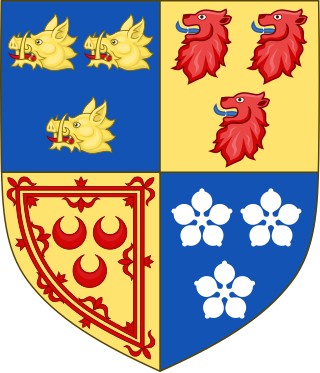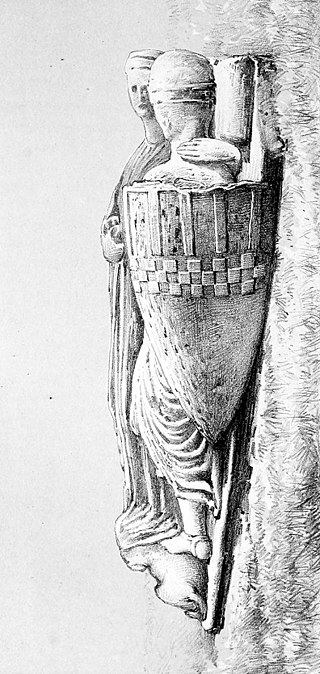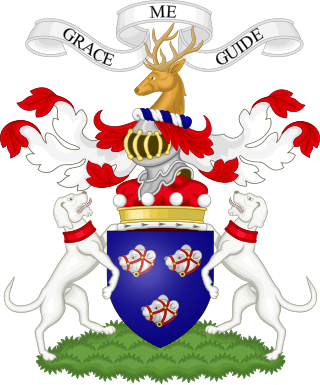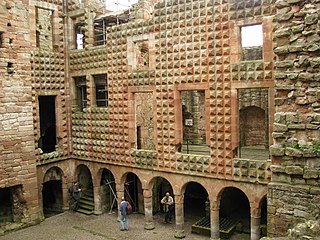
John Douglas, 2nd Earl of Morton died 9 September 1513 at the Battle of Flodden. [2]

John Douglas, 2nd Earl of Morton died 9 September 1513 at the Battle of Flodden. [2]
He was the son of James Douglas, 1st Earl of Morton and Princess Joan Stewart, Countess of Morton, daughter of James I of Scotland by his wife Lady Joan Beaufort. [3] He became earl in 1493, upon his father's death. He was succeeded by his son James Douglas, 3rd Earl of Morton.
A very wealthy man, John, unlike many of his peers, did not become embroiled in the intrigues and politics of his day. [4] Instead, the shrewd Earl of Morton worked to improve his holdings and was quite the litigator in his time, successfully defending his interests in court. [5] It turned out later that John, as lord of Dalkeith was aware the land had great value both above and below the surface and in fact sat on what was later described as the Great Midlothian Coalfield. [4]
He married Janet Crichton, daughter of Patrick Crichton of Cranston-Riddel [6] and had two sons and two daughters:

James Douglas, the 4th Lord of Dalkeith, was created the 1st Earl of Morton in 1458.
George Leslie, 4th Earl of Rothes was a Scottish nobleman and diplomat.

Clan Oliphant is a Highland Scottish clan.

Alexander Seton, 1st Earl of Huntly, who adopted the family name of Gordon from about 1457, was a powerful 15th-century Scottish magnate. He was knighted in 1439/1440 and was Lord of Badenoch, Gordon, Strathbogie and Cluny.
George Gordon, 2nd Earl of Huntly was a Scottish nobleman and Chancellor of Scotland from 1498 to 1501.

Walter Bailloch, also known as Walter Bailloch Stewart, was distinguished by the sobriquet Bailloch or Balloch, a Gaelic nickname roughly translated as "the freckled". He was the Earl of Menteith jure uxoris.

Joan Stewart, Countess of Morton, also called Joanna, was the daughter of James I, King of Scotland, and the wife of James Douglas, 1st Earl of Morton. She was known, in Latin, as the muta domina [mute lady] of Dalkeith.
Annabella of Scotland was a Scottish princess, a member of the House of Stewart, and by her two marriages Countess of Geneva and Countess of Huntly. Both of her marriages were annulled, the first without being consummated and the second on grounds of consanguinity.

Clan Forbes is a Highland Scottish clan from Aberdeenshire, Scotland.

Francis Stewart, 5th Earl of Bothwell, was Commendator of Kelso Abbey and Coldingham Priory, a Privy Counsellor and Lord High Admiral of Scotland. He was a notorious conspirator who led several uprisings against his first cousin, King James VI, all of which ultimately failed, and he died in poverty in Italy after being banished from Scotland. Francis's maternal uncle, the 4th Earl of Bothwell, was the chief suspect in the murder of James VI's father, Lord Darnley.
Alexander Gordon, 3rd Earl of Huntly was a Scottish nobleman. He was a member of Parliament, a member of the Privy Council, a regent and Lieutenant of the kingdom.
William Crichton (1598–1691) was the 2nd Earl of Dumfries and a privy councillor to Charles II of England. After the Glorious Revolution, Crichton resigned his titles on 10 September 1690 and had them restored on 3 November 1690 by the new King William III of England. Although he produced two sons, they both pre-deceased William, so his titles passed to his grandson William.

Sir William Oliphant, Lord of Aberdalgie and Dupplin, was a Scottish magnate, knight and leader during the Wars of Scottish Independence.

William Keith, 4th Earl Marischal was a Scottish nobleman and politician.
Sir Adam de Gordon, Lord of Gordon was a 14th-century Scottish baron.
Sir Alexander Livingston of Callendar was a significant figure in the early part of the reign of King James II of Scotland.

Sir Edward Keith was a Scottish nobleman and hereditary 11th Marischal of Scotland.
Alexander Seton, Lord Gordon was a Scottish baron, Lord of Parliament and progenitor of the Gordon Earls and Marquesses of Huntly.
Alexander Abernethy, 6th Lord Saltoun was a Scottish landowner and courtier.
Sir Claud Hamilton of Shawfield, PC (Ire), also called of Leckprevick, a younger son of Claud Hamilton, 1st Lord Paisley in Scotland, was a gentleman of the privy chamber of King James VI and I, an undertaker in the Plantation of Ulster, and a privy counsellor in Ireland.